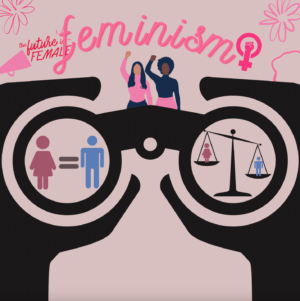Men and women can be happily platonic – if you let them
Others’ expectations of romance can put strain on otherwise healthy friendships.
February 25, 2023
“Everyone says you can’t have a guy best friend that doesn’t want to hook up,” a female user posted on TikTok, “But I do. […] He goes out of state with me to meet guys I met online. He calls me every day after work. He makes me drive him to the dollar store for noodles. The best friend I’ve ever had.”
Cue thousands of comments about how they’re madly in love, but just don’t realize it yet.
Honestly, I had thought we as a society were beyond the archaic assumption that relationships between men and women cannot be platonic. Not only is it close-minded, it’s also flat-out weird and invasive to draw conclusions about other people’s relationships, especially when you don’t know them.
So why are we still stuck on defunct gender roles?
According to the Embryo Project, gender identity “refers to the socially constructed roles, behaviors, and actions people take on, usually in relation to expectations of masculinity or femininity.” It’s undeniable that in our current society, traditional gender roles do influence our day-to-day interactions to a large extent. Is there truth in the assumption that our friendships with the opposite sex are shaped by these expectations? A 2012 study of pairs of heterosexual male-female friends found that men, in particular, reported high levels of attraction to their female friends that they intended to act on.
As a woman, I’ve heard countless cautionary tales of women whose close male friends completely disappeared when they became romantically unavailable – or worse, tried to take advantage of them after years of trust and vulnerability. It’s scary, and it’s difficult to form any relationship with someone when you can’t be certain that their motivations align with yours.
But instead of holding the men who engage in this predatory behavior accountable, why do we put suspicion on opposite-sex friendships as a concept? When we see healthy interactions between men and women, why do we find it necessary to pick them apart and assume the worst?
According to a Cambridge University study, people with a negative perception of opposite-sex friendships were more likely to lash out at a partner over a friend of the opposite sex. It’s only natural that if we constantly question and scrutinize people’s meaningful relationships, we breed resentment, bringing down normal interactions for no good reason.
The truth is that many male-female interactions that we see as romantic would never be viewed in that context with the same gender. Any healthy friendship should include spending time with and emotionally supporting your friends – if you can’t understand that, then that says something about the quality of your own friendships. Why is it so difficult to believe that men and women can be decent to each other, not because of attraction, but because they simply have appreciation and respect for other people?
And what about people who are attracted to multiple genders? Can they not be friends with anyone? Are they cursed by the ever-present threat of romance, doomed to have no solid relationships in their lives?
Yes, there are instances where male and female friends do end up having feelings for each other. Good for them. But that’s just one type of relationship, and is just as possible as a wholly platonic bond. There’s no need to make other people uncomfortable by forcing their relationships into a box.
Instead of devoting your valuable free time to pondering whether those opposite-sex friends you saw are hiding their true relationship status, try minding your own business and letting men and women form wholesome, happy friendships.






